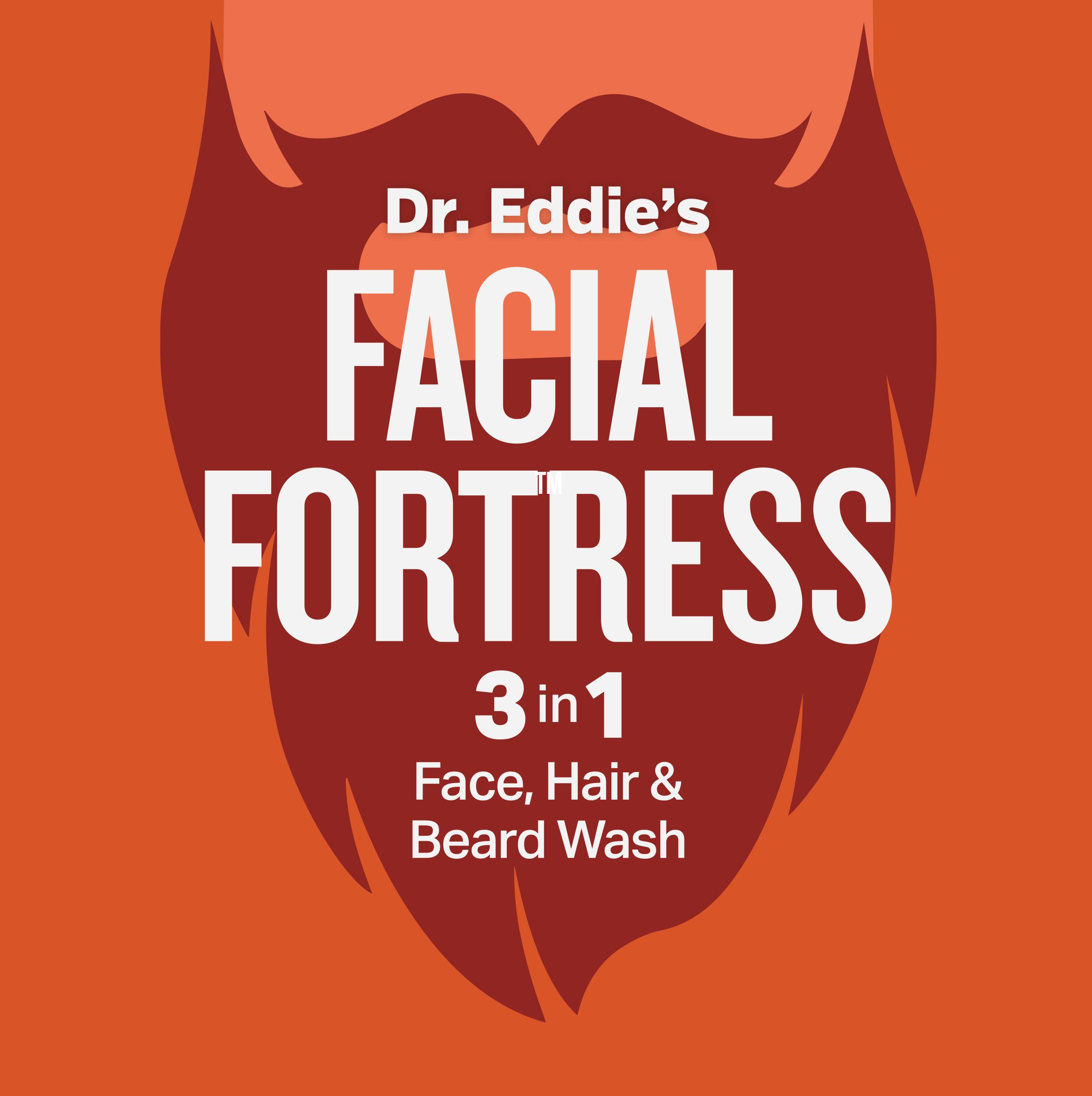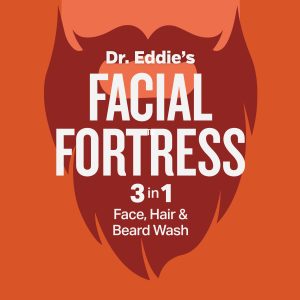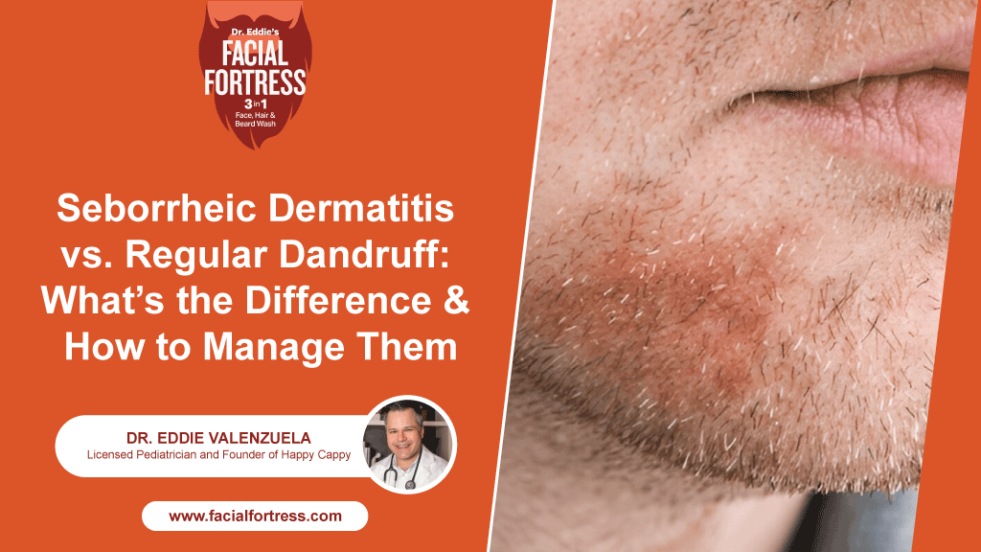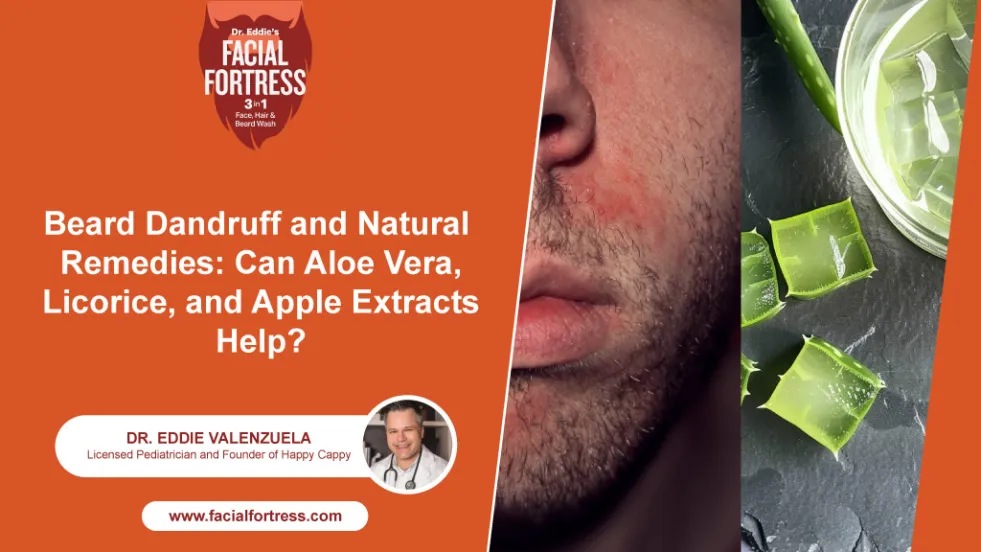What Causes an Itchy Beard and How to Fix It?
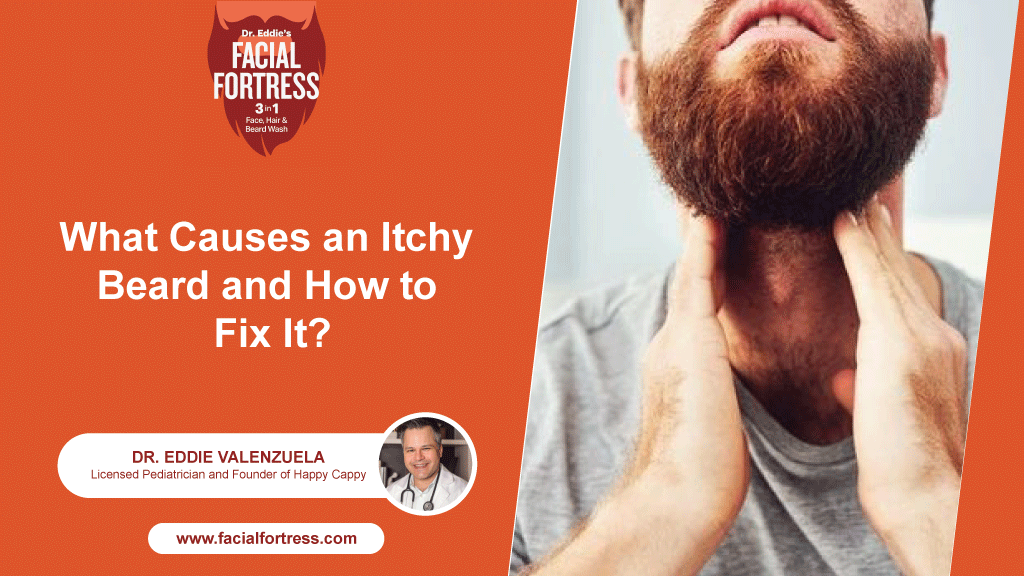
Whether you’re growing your beard for the first time or have been growing one for years, beard itch is one of the most common issues experienced by men worldwide. While most of the time it is caused by dry skin or harsh chemicals in your beard care products, it can sometimes also be a sign or symptom of an underlying skin condition.
The reason why you landed on this blog is most probably because you are tired of trying to hide that irresistible urge to scratch your beard, especially during the most important moments of your life.
But don’t worry, we have got you covered. This blog will help you understand all the possible causes for an itchy beard and how to get rid of them.
Does Itchy Beard Mean It’s Growing?
Yes, sometimes itching on the beard can be caused by hair growth, especially if you are growing it for the first time, or you are in an early beard growth stage. The small, sharp bristles or hair that make up your beard usually rub against your skin nd cause the itching and irritation.
So don’t worry, it’s not just you; this is a normal part of the beard-growing stage that everyone has to go through. The itching usually starts to get better once your beard grows longer.
How Long Does the Itchy Beard Stage Last?
Once you get to know that your beard itch is caused by new growth, the first question that often comes to mind is “When does the itchy beard stage end?” Well, the answer may vary from person to person depending on how fast their facial hair grows.
However, it typically lasts for about 1 to 2 weeks. Once the beard starts to grow longer and softer, and your skin becomes familiar with the new growth, the itching usually fades away.
But if you notice that your itching is not getting better, or is getting worse, then there are chances that something else is causing it.
Why is My Beard Itchy?
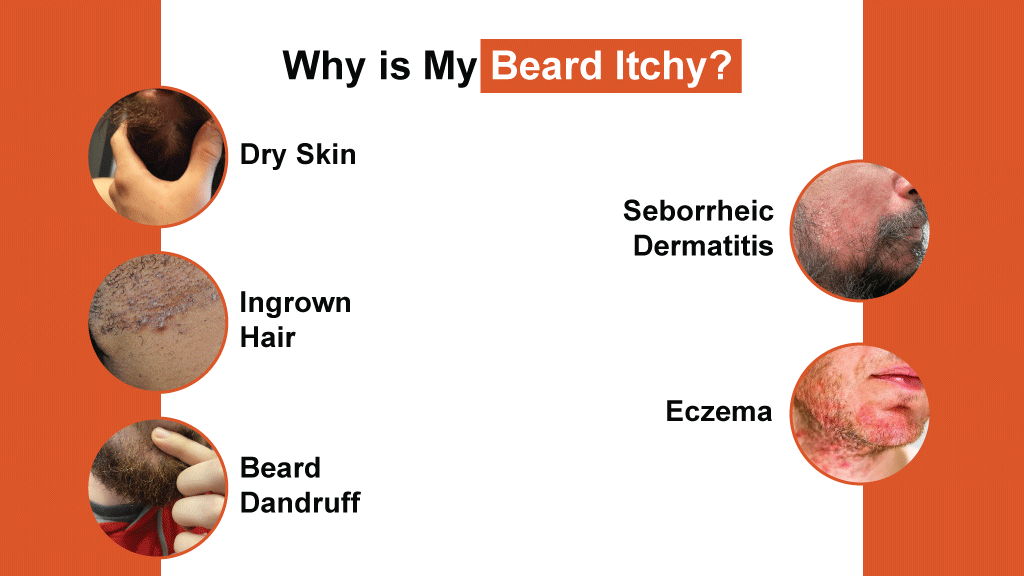
If you have also been wondering, “Why is my beard so itchy?”, here are some of the most common factors and skin conditions that might be causing the itch.
Dry Skin
Dry skin, also known as xerosis, is one of the most common reasons why men experience dry, itchy skin under beard. It is basically when your skin lacks the essential moisture to keep the skin soft, smooth, and hydrated.
Skin dryness can be caused by a number of reasons, such as:
- Dehydration
- Cold, dry air
- Harsh chemicals in skincare products
- Sun exposure
- Certain medications
- Skin conditions
Treatment
No matter what is causing your dry skin, the best way to get rid of it is to keep the skin under your beard moisturized. You can do this with the help of a beard oil, or always use a beard wash that contains skin hydrating ingredients to wash your beard.
Ingrown Hair
Ingrown hair is when the hair, instead of growing outside the skin, grows back into the hair follicle. This can cause inflammation in the follicle and lead to itching on beard. People who have tight, curly hair are more likely to experience it.
This inflammation can sometimes become worse and lead to red, painful, pimple-like bumps on the skin.
Treatment
Use a scrub or a boar bristle brush to massage and exfoliate the skin gently; this can help the trapped hair get out.
Beard Dandruff
Just like the scalp, your beard can also be affected by dandruff, which some people refer to as beardruff. While beard itching is one of its most common symptoms. Beard dandruff can cause tiny white or yellow flakes to appear on the beard.
These flakes often fall down when you scratch or brush your beard, which can be even more frustrating than scalp dandruff because it’s more visible and can affect one’s self-confidence.
Treatment
Use a medicated beard shampoo for dandruff 2 to 3 times a week to wash your beard and reduce the appearance of flakes.
Seborrheic Dermatitis
Beard Seborrheic dermatitis is a more severe form of dandruff. It can cause intense itching and redness under beard. It can also lead to the appearance of thick, greasy, yellow scales and flakes on the beard.
The exact cause of this skin condition is not known; however, the researchers believe that it is caused by a combination of factors, such as
- Overproduction of sebum
- Overgrowth of Malassezia yeast on skin
- Skin sensitivity towards oleic acid
All of these factors are interconnected with each other, and when experienced at the same time, can lead to itching, redness, and scaling associated with seborrheic dermatitis.
Treatment
Use a medicated beard wash that contains pyrithione zinc as an active ingredient to cleanse your beard at least once daily. Once the flaking and scaling are under control, you can taper the use to 2 to 3 times a week.
Eczema
Eczema is a common inflammatory skin condition that causes red, dry, itchy, irritated skin. People who have a family history of asthma, atopic dermatitis, and allergic rhinitis (sometimes called hay fever) are more likely to experience it.
It is a chronic condition, which means that it can show up again and again in the form of eczema flare-ups. It is more common on the face, arms, legs, and in the skin folds.
While eczema usually affects children under the age of 5, it can also be experienced for the first time in adulthood, and in this case, it is known as adult-onset eczema. So, if you are experiencing an itchy skin rash under beard, there are chances you are experiencing an eczema flare-up.
Treatment
The best way to reduce the itching, irritation, and redness associated with eczema is to wash the skin under your beard with an eczema shampoo daily. And keep your skin moisturized with the help of a fragrance-free eczema cream.
Beard Care Mistakes
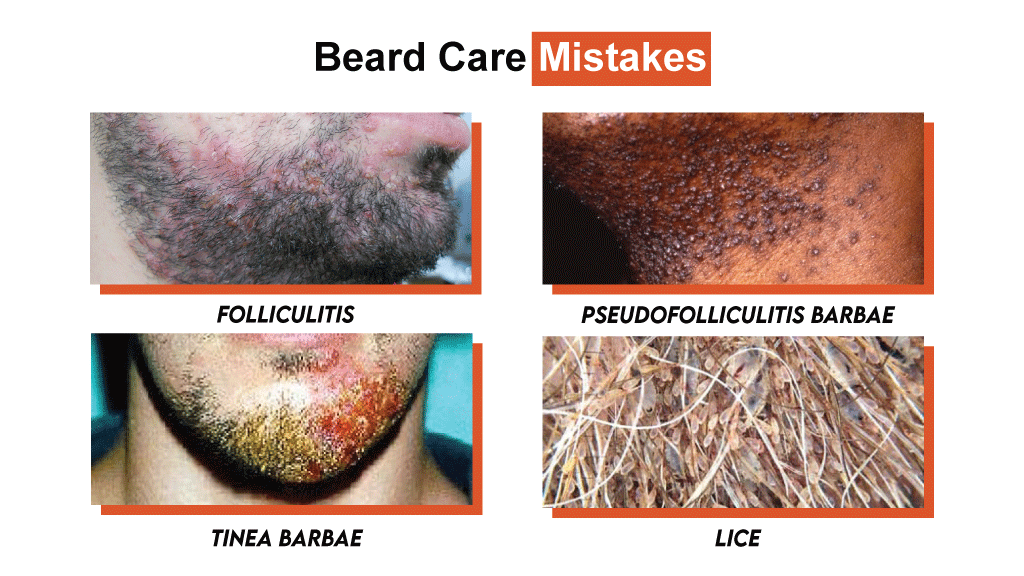
Most of us often try to take extra good care of our beards, because we love it. But sometimes we make small mistakes that actually result in a dry, itchy beard. Some of these common mistakes are:
- Using hot water to wash your beard.
- Using regular shampoo to wash the beard..
- Not moisturising the skin under your beard.
- Not brushing your beard.
- Using beard care products that contain harsh chemicals.
These little mistakes can have a great impact on your skin and beard health.
Treatment
Always use beard-specific products like Facial Fortress 3-in-1 beard wash to cleanse your beard daily. It is free from any of those harsh chemicals that may irritate your skin.
Folliculitis
It is a skin condition where the hair follicles of your beard can get inflamed due to a bacterial, viral, or fungal infection. It can lead to the appearance of red, tender, small bumps on the skin under your beard.
These bumps can also be itchy and painful to touch. It can be triggered by a number of factors, such as clogged pores, excessive sweating, rubbing of the skin, ingrown hair, poor shaving techniques, or using a dirty razor.
Treatment
If you suspect that you are experiencing folliculitis, then consult a dermatologist, who may prescribe the use of antibiotics or antifungal creams to make your condition better.
Pseudofolliculitis Barbae
Pseudofolliculitis barbae, also known as razor bumps, is a condition where facial hair grows back into the skin or cuts the skin from within the follicle. It usually occurs due to improper shaving techniques.
It can lead to the appearance of red, pus-filled bumps that look quite similar to acne or folliculitis. However, unlike folliculitis, it is non-infectious. The condition can lead to persistent itching and irritated skin under the beard if left untreated.
Treatment
People who are experiencing Pseudofolliculitis barbae are often advised to use an electric shaver instead of regular razors. And are advised to use Hydrocortisone creams and antibiotics to improve the condition.
Tinea Barbae
It is a fungal infection that is caused by a type of fungus called a dermatophyte. It usually affects the skin and hair follicles where the facial hair grows, like the cheeks, chin, and neck.
It is more common among men who are exposed to animals, as the fungus can be transferred from them. It can cause itchy, painful, red, crusting skin and bumps, and is often confused with bacterial infections.
Treatment
The doctor may prescribe the use of oral antifungal medication such as itraconazole and terbinafine to treat the condition.
Lice
While most people think that lice can only infect the scalp, the truth is that they can also affect your beard. The lice that affect your beard are known as pubic lice (Pthirus pubis). Just like your scalp, the lice attach themselves to the beard hair and feed on your blood, causing intense itching and irritation on the beard.
If you notice persistent itching, tiny white eggs, and a crawling sensation on your beard, consult a doctor immediately to receive the right treatment plan.
Treatment
The doctor usually prescribes the use of over-the-counter (OTC) anti-lice shampoos or creams to get rid of lice.
How to Get Rid of an Itchy Beard?
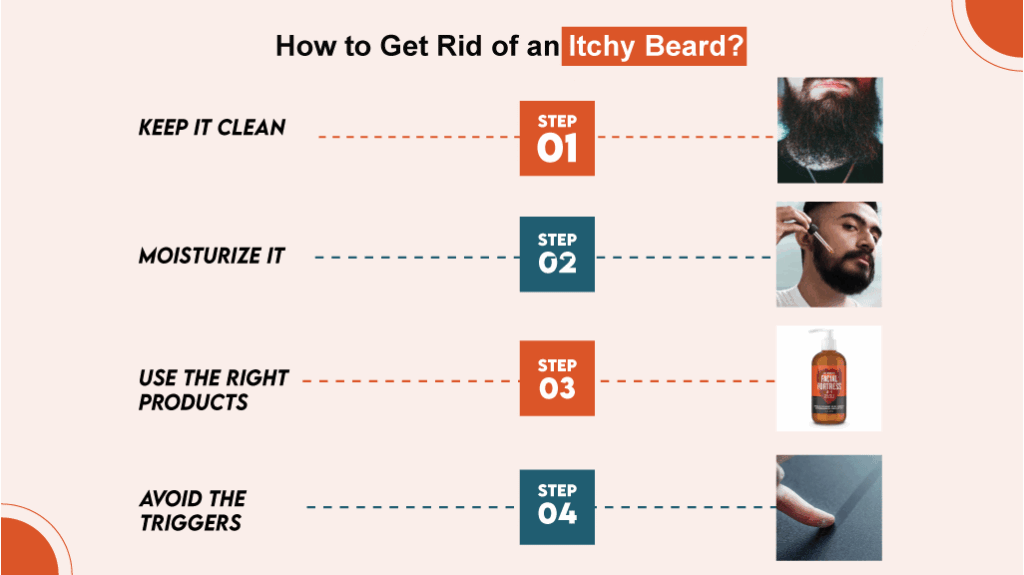
If you are also wondering “how to deal with itchy beard?” Here are a few things that you must include in your beard care routine that can help soothe the itching and irritation.
Keep it Clean
Cleansing your beard should be the first step in your daily routine because beards have to experience the same dirt, pollution, sebum, and bacteria that the rest of your skin does. These can clog the pores and further exacerbate your itching.
This is why you must wash your beard at least 2 to 3 times a week with the help of a gentle, daily, sulfate-free beard wash. And if you have an oily skin type or spend more time outdoors, you can wash your beard daily as well.
Moisturize It
Just like your skin, the next step in your beard care routine should be to moisturize it. Moisturize it using a fragrance-free beard oil, balm, or moisturizer after washing it, as it is the best thing for an itchy beard triggered by dry skin.
Keeping the beard moisturized will not only help keep it hydrated, but is also very beneficial for its overall health.
Use the Right Products
If you often notice your beard itchy after a shower, then most probably it’s because you are using the wrong products. Sometimes, even beard-specific products can cause irritation and itching on the skin because they contain harsh chemicals like fragrances, parabens, sulfates, dyes, and phthalates, which can strip away natural oil from the skin and leave your beard dry.
This is why it is essential that you carefully check the ingredients before buying your beard shampoo or any other product. And make sure that they are hypoallergenic and free from any harsh chemicals. If you’re searching for a beard- and skin-friendly beard wash, try Facial Fortress. It is specially developed to be safe for even the most sensitive skin types.
Avoid the Triggers
Sometimes the itching is caused by environmental triggers that can lead to dry skin, eczema flare-up, or even allergic reactions. If you notice that your beard becomes extra itchy after coming in contact with a certain trigger, such as dust, pollen, cold air, or a specific product.
Then try avoiding these irritants to prevent your condition from getting worse.
Treat the Underlying Condition
If your beard is itchy and flaky, it’s most probably because of dandruff or seborrheic dermatitis, and the best way to get rid of it is to use an anti-dandruff beard shampoo. A shampoo like Facial Fortress that contains pyrithione zinc as an active ingredient.
Zinc pyrithione is an FDA-approved active ingredient that has been known to be effective in reducing the itching, flaking, and scaling associated with dandruff and seborrheic dermatitis on skin and scalp.
If eczema is causing your itch, then follow a proper eczema skincare routine that includes the use of a shampoo for eczema to cleanse your beard.
If you are unsure about anything or your condition is not getting better with proper care, then it is best to consult a dermatologist.
How to Avoid an Itchy Beard?
Sometimes, an itchy beard is caused by small mistakes we make in our daily lives, and making a few changes can help prevent the itch from happening in the first place. Here are a few things that you can do to avoid the beard itch.
- Keep your beard clean.
- Moisturize it daily.
- Always use lukewarm water, rather than hot water, to wash your beard.
- Make sure your beard products are free from any of those skin-irritating chemicals.
- Comb your beard every day.
- Trim your beard at least once every 4 weeks.
- Keep your body hydrated by drinking plenty of water each day.
- Keep your beard shaving tools clean.
- Cover your beard while going out with the help of a cloth.
Best Beard Wash for Itchy Beard?

The best beard wash for an itchy beard is one that is hypoallergenic and free from harsh chemicals, such as Facial Fortress 3-in-1 Beard Shampoo. It is a multi-purpose cleanser that can be used to clean your beard, face, and scalp hair at the same time.
This cleanser is
- Fragrance-free
- Sulfate-free
- Paraben-free
- Dye-free
- Dimethicone-free
- Phthalate-free
- BPA-free
- Cruelty-free
- Hypoallergenic
Instead of containing harsh chemicals, it is infused with natural ingredients like licorice root extract, apple fruit extract, glycerin, and provitamin B5, which help keep the skin and beard soft, smooth, and moisturized.
And the best part is that if you are dealing with beard dandruff or seborrheic dermatitis, it contains 0.95% pyrithione zinc as an active ingredient that can help reduce flaking and scaling.
Conclusion
Itchy beard can be caused by various factors, from dry skin, ingrown hair, using the wrong products, to skin conditions like seborrheic dermatitis, beard dandruff, eczema, lice, folliculitis, and tinea barbae.
However, the good news is that by making a few lifestyle changes, following a proper beard care routine, and using the right products, you can help soothe the itching and irritation on your beard.
However, if your itching is caused by a certain skin condition, then treating that underlying skin condition will help soothe the itch. If you are dealing with seborrheic dermatitis or dandruff, use Facial Fortress 3-in-1 Medicated Wash to reduce itching, flaking, and scaling.
Recent Post
Frequently Asked Questions
How do I make my beard less scratchy?
Does coconut oil stop beard itch?
Can I put Vaseline on my itchy beard?
What does scratchy beard mean?
How do I get rid of beardruff?
- Oily skin and beard dandruff: why over‑washing can make your beard flakier - December 23, 2025
- Why Your Beard Itches and Flakes: Seborrheic Dermatitis or Product Reaction? - December 23, 2025
- Seborrheic Dermatitis vs. Regular Dandruff: What’s the Difference and How to Manage Them - November 17, 2025
